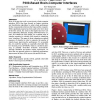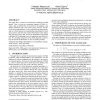920 search results - page 79 / 184 » Computing the Frequency of Partial Orders |
SIGMOD
2005
ACM
15 years 3 months ago
2005
ACM
Decision makers of companies often face the dilemma of whether to release data for knowledge discovery, vis a vis the risk of disclosing proprietary or sensitive information. Whil...
IUI
2010
ACM
15 years 6 months ago
2010
ACM
Most of the previous work on non-invasive brain-computer interfaces (BCIs) has been focused on feature extraction and classification algorithms to achieve high performance for the...
CIKM
2005
Springer
15 years 3 months ago
2005
Springer
This paper shows a scheme for incremental evaluation of XPath queries. Here, we focus on a monotone fragment of XPath, i.e., when a data is deleted from (or inserted to) the datab...
EWC
2002
14 years 9 months ago
2002
An object-oriented (OO) framework for Partial tial Equations (PDEs) provides software abstractions for numerical simulation of PDEs. The design of such frameworks is not trivial, a...
SIGECOM
2010
ACM
14 years 10 months ago
2010
ACM
Cut games and party affiliation games are well-known classes of potential games. Schaffer and Yannakakis showed that computing pure Nash equilibrium in these games is PLScomplete....


